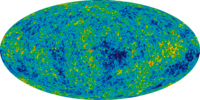
Photo from wikipedia
We investigate the gravitational property of the quantum vacuum by treating its large energy density predicted by quantum field theory seriously and assuming that it does gravitate to obey the… Click to show full abstract
We investigate the gravitational property of the quantum vacuum by treating its large energy density predicted by quantum field theory seriously and assuming that it does gravitate to obey the equivalence principle of general relativity. We find that the quantum vacuum would gravitate differently from what people previously thought. The consequence of this difference is an accelerating universe with a small Hubble expansion rate H∝Λe-βGΛ→0 instead of the previous prediction H=8πGρvac/3∝GΛ2→∞ which was unbounded, as the high energy cutoff Λ is taken to infinity. In this sense, at least the “old” cosmological constant problem would be resolved. Moreover, it gives the observed slow rate of the accelerating expansion as Λ is taken to be some large value of the order of Planck energy or higher. This result suggests that there is no necessity to introduce the cosmological constant, which is required to be fine tuned to an accuracy of 10-120, or other forms of dark energy, which are required to have peculiar negative pressure, to explain the observed accelerating expansion of the Universe.
Journal Title: Physical Review D
Year Published: 2017
Link to full text (if available)
Share on Social Media: Sign Up to like & get
recommendations!